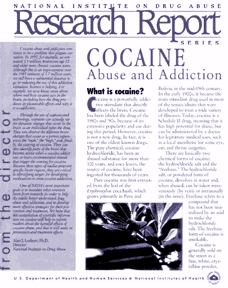To help inform the public about the harmful effects of cocaine abuse and aid in prevention and treatment efforts, NIDA has issued a new Research Report, "Cocaine Abuse and Addiction." The 8-page report summarizes the latest scientific findings about the nature and extent of cocaine abuse and addiction, the consequences of cocaine abuse, and effective treatments for those addicted to cocaine.
The report is the latest in a series of NIDA Research Reports on used drugs. Other Research Reports cover methamphetamine, nicotine, heroin, inhalants, and anabolic steroids. Highlights from "Cocaine Abuse and Addiction" are below.
What is cocaine?
Cocaine is a powerfully addictive drug that directly affects the brain. The drug has two basic chemical forms: a powdered form and a nonpowdered form. The powdered form can be taken orally or intranasally, rubbed onto mucous tissues, or dissolved in water and injected intravenously. The nonpowdered form, which is processed from the powdered form, is called "crack" on the street and can be smoked.
How does cocaine produce its effects?
Cocaine blocks reabsorption of a neurotransmitter called dopamine by nerve cells, or neurons, in one of the brain's key pleasure centers. The resulting buildup of dopamine in the space between nerve cells causes continuous stimulation of receiving neurons. Scientists believe this action plays a major role in the euphoria reported by cocaine abusers.
What are the short-term effects of cocaine use?
Cocaine's effects appear almost immediately and disappear in a few minutes or hours, depending on the route of administration. Injected and smoked cocaine produces intense effects rapidly. Small amounts make the user feel euphoric, energetic, talkative, and alert. Large amounts intensify these feelings but may lead to bizarre, erratic, and violent behavior. Physiological effects include constricted blood vessels, dilated pupils, and increased temperature, heart rate, and blood pressure. Some users report feelings of restlessness, irritability, and anxiety. In rare instances, sudden death can occur, usually from cardiac arrest followed by respiratory arrest.
What are the long-term effects of cocaine use?
Addiction, irritability, mood disturbances, restlessness, paranoia, and auditory hallucinations are among the possible long-term consequences of repeated cocaine use.
What are the medical consequences of cocaine abuse?
Cardiovascular effects include disturbances in heart rhythm and heart attacks. Respiratory effects include chest pain and respiratory failure. Strokes, seizures, and headaches are among the neurological effects. Gastrointestinal complications include abdominal pain and nausea. Cocaine abusers, especially those who inject the drug, also are at increased risk of infectious diseases, such as HIV/AIDS and hepatitis.
What treatments are effective for cocaine abuse?
Many behavioral treatments have been found to be effective in treating cocaine addiction when they are matched to the needs of the individual patient. Contingency management, cognitive-behavioral coping skills treatment, and therapeutic communities all have been effective with cocaine-addicted patients. Contingency management rewards patients for staying in treatment and remaining cocaine-free. Short-term cognitive-behavioral coping skills treatment helps patients recognize and avoid situations in which they are likely to use cocaine and learn to cope more effectively with their problems. Therapeutic communities are long-term residential programs that offer a full range of rehabilitative and support services for cocaine-addicted patients with severe problems. No medications are currently available to treat cocaine addiction. However, several promising treatment compounds are being tested for safety and efficacy.

